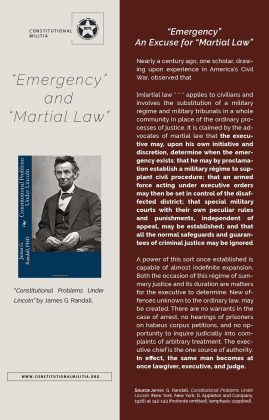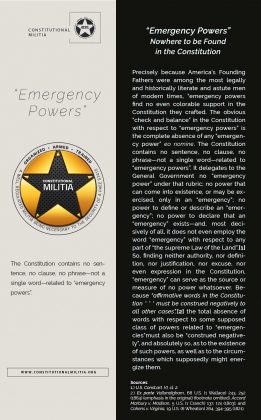Last Updated on February 19, 2023 by Constitutional Militia
“Emergency Powers”
The real “emergency” that confronts Americans is the lust of aspiring and conspiring usurpers and tyrants for power WE THE PEOPLE have withheld from them in our Constitution.
“Emergency Powers”: An Apology for Undefined and Therefore Unlimited Government
In the ancient Roman Republic, the Senate could appoint a temporary dictator, and invest him with novel and often sweeping powers, to deal with extraordinary conditions. On both sides of the wall behind the Speaker’s desk in the United States House of Representatives are prominently displayed Roman fasces; an ax within a bundle of sticks, symbolizing the plentitude of governmental power—a classical representation of Mao Tse-tung’s dictum that “[p]olitical power grows out of the barrel of a gun”.[1] The illusions of modern politicians aside, however, that historical allusion does not invest Congress (or even the General Government as a whole) with all the powers of a Roman Senate, let alone a license to arm the President with the authority of an ancient Roman dictator—or a latter day Duce.[2]
The modern doctrine of “emergency powers” is striking because—unlike the accepted authority of the Roman Senate to appoint a dictator—“emergency powers” lack both a specific source in the Constitution and a definition. If the Constitution contained a clause explicitly delegating to Congress “emergency powers”, delineating the content of such powers, and setting out specific conditions under which they could be exercised, by whom, and for what purposes, no one could complain. No such provision exists, however. Today, public officeholders simply announce that an “emergency” exists and that they are assuming “emergency powers” to deal with it—with both ostensible “emergency” and the “powers” that supposedly flow from it unilaterally defined by themselves without reference to anything in the Constitution. And necessarily so—for if some specific reference to the Constitution could be made, invocation of “emergency powers” would be supererogatory. To any legally literate individual, this situation is intolerable.[3]
The Constitution itself exposes the claim that an “emergency” with no specific constitutional definition can create new powers, also with no specific constitutional definitions, as nothing but a trick political con men employ to confuse and stampede Americans into acquiescing in legislative or executive action that they would otherwise recognize and condemn as dangerous hogwash. It is double-talk for the purpose of double-dealing. Legitimate governmental powers have nothing to do with it. If such powers actually existed, their proponents would not have to append the desperate adjective “emergency”.[4]
Constitutionally speaking, “emergency” has neither place nor meaning, and therefore by itself cannot serve as the justification for or measure of any power whatsoever.
In short, Congress, the President, and the Supreme Court—and the States, subject in addition to their own constitutions—have no more authority to expand their powers (or evade their disabilities) simply by declaring an “emergency” than by screaming “shazaam”.
































